- Home
- Niccolò Ammaniti
Me and You Page 2
Me and You Read online
Page 2
Gritting my teeth, as the skis kept slipping and the backpack cut into my shoulders, I turned off my mobile and walked through the gates. I passed by the moss-covered fountain where the goldfish live and the English-style lawn with the marble benches you weren’t allowed to sit on. My mother’s car was parked next to the shelter near the main door, under the palm tree she had saved from the red palm weevil.
Praying that I wouldn’t run into anyone on their way out of the building I slipped into the foyer, ran along the red carpet past the lift and dived down the stairs which led to the cellars.
When I made it downstairs I was out of breath. Patting my way along the wall I found the light switch. Two long, faded striplights came on, illuminating a narrow, windowless corridor. Along one side ran pipes, along the other, closed doors. Standing in front of the third door, I stuck my hand in my pocket, pulled out a long key and turned it in the lock.
The door opened onto a large, rectangular room. Up high, two small windows veiled with dust let in a sliver of light which fell on furniture covered with sheets, on boxes full of books, saucepans and clothes, on termite-ridden window frames, on tables and wooden doors, on lime-crusted sinks and stacks of upholstered chairs. Stuff was piled up everywhere I looked. A flowery blue settee. A heap of mildewed mattresses. A collection of moth-eaten Reader’s Digests. Old records. Crooked lampshades. A cast iron bedhead. Rugs rolled up in newspapers. A big ceramic bulldog with a broken paw.
A Fifties household amassed in a cellar.
But over on one side was a mattress with blankets and a pillow. Neatly set out on top of a coffee table were ten tins of corned beef, twenty of tuna, three bags of sliced bread, six jars of vegetables in oil, twelve bottles each of Ferrarelle sparkling water, fruit juice and Coke, a jar of Nutella, two tubes of mayonnaise, biscuits, snacks and two bars of milk chocolate. A small television sat on a chest, along with my PlayStation, three Stephen King novels and a couple of Marvel comics.
I locked the door.
This would be my ski week.
2
I started talking when I was three years old. Small talk has never been one of my strengths. If someone I didn’t know said something to me I would answer yes, no, I don’t know. And if they insisted, I would answer with whatever they wanted to hear me say.
Once you’ve thought something, what need is there to say it aloud?
‘Lorenzo, you’re like a cactus: you grow without bothering anyone, you just need a drop of water and a bit of light,’ an old nanny from Caserta used to say to me.
My parents used to bring over au pairs for me to play with. But I preferred playing on my own. I would close the door and imagine that my room was a cube that floated through space.
My problems started at primary school.
I have very few memories of that period. I remember my teachers’ names, the hydrangeas in the schoolyard, the metal containers full of steaming hot maccheroni in the canteen. And the others.
The others were anyone who wasn’t my mum, my father and Grandma Laura.
If the others didn’t leave me alone, if they pushed me too far, the blood would rise up through my legs, flood my stomach and spread out to the tips of my hands, and then I would clench my fists and lash out.
When I pushed Giampolo Tinari off the wall and he fell on his head on the cement and had to get stitches in his forehead, they called home.
In the staff room, my teacher told my mother: ‘He looks like he’s at the station waiting for the train to take him home. He doesn’t annoy anyone, but if any of his classmates tease him he starts shouting, turns red and starts throwing whatever he can get his hands on.’ The teacher had studied the floor, embarrassed. ‘Sometimes he is frightening. I don’t know . . . I would recommend you . . .’
My mother took me to see Professor Masburger. ‘You’ll see. He helps a lot of kids.’
‘But how long do I have to go for?’
‘Three quarters of an hour. Twice a week. What do you say?’
‘Yeah, that’s not too much,’ I told her.
If my mother thought I’d end up being like the others that was fine with me. Everyone had to think that I was normal, Mum included.
Nihal would take me. A fat secretary wearing a caramel perfume would lead me into a mouldy-smelling room with a low ceiling. The window faced a grey wall. On the hazelnut-coloured walls hung old black and white photos of Rome.
‘But does everyone who has problems lie there?’ I asked Professor Masburger, as he pointed towards a faded brocade couch.
‘Of course. Everyone. This way you can talk more freely.’
Perfect. I would pretend to be a normal kid with problems. It wouldn’t take much to trick him. I knew exactly how the others reasoned, what they liked and what they wished for. And if what I knew wasn’t enough, that couch I was lying on would transfer to me, like a warm body transfers heat to a cold body, the thoughts of the kids that had lain there before me.
And so I told him all about a different Lorenzo. A Lorenzo who was embarrassed to talk to the others but who wanted to be like them. I liked pretending that I loved the others.
A few weeks after I began the therapy I heard my parents whispering in the living room. I went into the study. I took a few volumes from the bookshelves and put my ear up against the wall.
‘So what’s wrong with him?’ Father was saying.
‘He said that he has a narcissistic personality disorder.’
‘What does that mean?’
‘He says that Lorenzo is unable to feel empathy for others. For him everything that’s outside his circle of affections doesn’t exist, has no effect on him. He believes he is special and only people as special as him can understand him.’
‘You want to know what I think? That this Masburger is a dickhead. I have never seen any boy as affectionate as our son.’
‘That’s true, but only with us, Francesco. Lorenzo thinks that we’re the special people and he considers everyone else to be inferior.’
‘He’s a snob? Is that what the professor is trying to tell us?’
‘He said that he has an inflated sense of self-importance.’
My father burst into laughter. ‘Thank goodness. Just think if he had a low sense of self-importance. That’s enough, take him away from that worthless idiot before he fills up our son’s brain with nonsense for good. Lorenzo is a normal child.’
‘Lorenzo is a normal child,’ I repeated to myself.
Little by little I worked out how I should act at school. I had to keep to myself, but not too much, otherwise I stuck out.
I was like a sardine in a school of sardines. I camouflaged myself like a stick insect on dry branches. And I learned to control my anger. I imagined that I had a tank in my stomach, and when it filled up I emptied it out through my feet and the anger ended up in the ground and penetrated into the world’s guts and was burned up by the eternal flames.
Now nobody bothered me.
For middle school I was sent to St Joseph’s, an English school filled with the children of diplomats, of foreign artists who had fallen in love with Italy, of managers from the US and of wealthy Italians who could afford the fees. Everyone was out of place there. They all spoke different languages and looked like they were just passing through. The girls kept to themselves and the guys played football on the big field opposite the school. I fitted in well.
But my parents weren’t satisfied. I had to have friends.
Football was a stupid game, everyone running around after a ball, but that’s what everyone else liked. If I learned to play, I was home free. I would have some friends.
I found the courage and put myself in goal, where nobody ever wanted to play. I realised that defending it from enemy attacks wasn’t all that bad. There was this one guy, Angelo Stangoni, who was unstoppable whenever he got the ball. He would shoot like a lightning bolt to the goal and kick really hard. One day a defender knocked him down with a kick. Penalty. I lined myself up in the middle of the goa
l. He took a run up.
I am not a man, I said to myself, I am a nyuzzo, a hideous but incredibly agile animal produced in an Umbrian laboratory that has just one purpose in life: to defend the earth from a mortal meteorite.
Stangoni kicked hard, straight down the line, and I flew like only a nyuzzo can, stretching out my arms. And the ball was there in my hands. I saved it.
I remember how all my team-mates hugged me and it was nice because they thought I was one of them.
They put me on the team. Suddenly I had schoolmates who called me at home. My mother would answer and she was happy to be able to say: ‘Lorenzo, it’s for you.’
I used to say I was going over to my friend’s house but really I went and hid out at Grandma Laura’s. She lived on the top floor of an apartment building near ours, with Pericle, an old Basset Hound, and Olga, her Russian carer. We spent our afternoons playing canasta. She would drink Bloody Marys and I would have tomato juice with pepper and salt. We had made a pact: she wouldn’t tell about my not going out with my friends and I wouldn’t tell about her drinking Bloody Marys.
But middle school was soon over and my father called me into his study, sat me down in an armchair and said, ‘Lorenzo, I think it’s time you went to a public high school. You’ve had enough of these private schools for spoiled kids. So, what would you prefer, mathematics or history?’
I glanced quickly at all his heavy volumes on the ancient Egyptians and on the Babylonians, neatly lined up on his bookshelf. ‘History.’
He gave me a satisfied pat on the shoulder. ‘Excellent, old boy, we like the same things. You’ll enjoy the Classics high school, you’ll see.’
When I walked up to the entrance of the high school on my first day I almost fainted.
It was hell on earth. There were hundreds of kids. It felt like I was standing outside the gates of a rock concert. Some of them were way bigger than me. They even had beards. The girls had tits. They rode scooters, skateboards. Some were running. Some were laughing. Some were yelling. They were going in and out of the cafeteria. One guy climbed up a tree and hung a girl’s backpack on a branch and she threw stones at him.
Anxiety took my breath away. I leaned up against a wall covered in graffiti. Why did I have to go to school? Why did the world work like this? You are born, you go to school, you work and you die. Who had decided that that was the right way? Couldn’t we live differently? Like primitive man? Like Grandma Laura, who when she was little had studied at home and had the teachers come to her. Why couldn’t I do that too? Why didn’t they just leave me alone? Why did I have to be just like the others? Couldn’t I live by myself in a forest in Canada?
‘I am not like them. I have an inflated sense of self-importance,’ I whispered, as three colossal beasts walking arm in arm pushed me aside like I was a bowling pin. ‘Piss off, shrimp.’
In a trance I felt my legs as stiff as tree trunks walk me into class. I sat in the second last row, near the window, and tried to make myself invisible. But I realised that the camouflage technique didn’t work in this hostile planet. In this school the predators had evolved, were much more aggressive and they moved in herds. Any introversion, any unusual behaviour, was immediately noticed and punished.
They called me out. They picked on me for the way I dressed, because I didn’t talk. And then they stoned me with chalk dusters.
I begged my parents to let me change schools – one for misfits or deaf and dumb students would be perfect. I came up with every excuse in the book to stay home. I stopped studying. In class I spent my time counting the minutes left before I could get out of that jail.
One morning I was at home with a fake headache and I saw a documentary on television about insects that mimic other insects.
Somewhere, in the tropics, lives a fly that imitates wasps. He has four wings, just like the other flies, but he keeps them one on top of the other, so that they look like two. He has a black and yellow striped belly, antennae and bulbous eyes and even a fake stinger. He can’t hurt you, he’s a nice insect, but dressed up as a wasp, the birds, the lizards, even human beings fear him. He can mosey into a wasp nest, one of the most dangerous and well-protected places in the world, and go unrecognised.
I had been going about it the wrong way.
Here’s what I had to do.
Imitate the dangerous ones.
I wore the same things the others wore. Adidas trainers, jeans with holes in them, a black hoodie. I messed up the parting in my hair and let it grow long. I even wanted to get my ear pierced but my mother forbade me. To make up for it, for Christmas, my parents gave me a scooter. The most popular one.
I walked like them, with my legs wide apart. I threw my backpack on the ground and kicked it around.
I mimicked them discreetly. There’s a fine line between imitation and caricature.
During the lessons I sat at my desk pretending to listen – but in actual fact I was thinking about my own stuff, making up science-fiction stories. I even went to PE classes. I laughed at the others’ jokes, I played stupid tricks on the girls. A couple of times I even answered back to the teachers. And I handed in a class test without answering a single question.
The fly had managed to trick them all, integrating perfectly with the waspian society. They thought I was one of them. That I was all right.
When I got home I told my parents that at school everyone said I was cool, and I made up funny stories about things that had happened to me.
But the longer I put on this show, the more different I felt. The chasm that separated me from the others grew deeper. On my own I was happy, with the others I always had to pretend.
Sometimes this scared me. Would I have to imitate them for the rest of my life?
It was like the fly was inside me, telling me how things really were. It told me that it only took a second for friends to forget about you, that girls are mean and they make fun of you, that the world outside your house is filled with competition, violence and suffocation.
One night I had a nightmare and I woke up screaming. I discovered that my T-shirt and jeans were my skin and my trainers were my feet. My jacket was as hard as an exoskeleton, and under it wriggled one hundred insect feet.
Everything went along pretty smoothly until one morning I wished, for just a moment, that I wasn’t a fly dressed up as a wasp, but that I was really a wasp.
During the break I would wander up and down the crowded school corridors like I had something to do, so that nobody got suspicious. Then just before the bell rang I would sit back down at my desk and eat my plain pizza with prosciutto, the same pizza that everybody bought from the school janitor. In the classroom the usual duster battle was taking place. Two sides faced each other, throwing it back and forth. If they happened to hit me, I would retaliate, trying, if possible, not to hit anybody so that I didn’t set off any further retaliation.
Alessia Roncato was sitting behind me. She and Oscar Tommasi were huddled together, talking intensely and writing down a list of names on a piece of paper.
What was on that list?
I shouldn’t have cared, not at all, and yet my stupid curiosity, which popped up occasionally for no apparent reason, made me slide my chair backwards to try and hear what they were saying.
‘Do you reckon they’ll let him come?’ Oscar Tommasi was saying.
‘If my mum talks to them, yeah,’ Alessia Roncato answered.
‘But can we all come?’
‘Sure, it’s really big . . .’
Somebody began to yell and I wasn’t able to hear anything else. They were probably trying to work out who they should invite to some party.
On the way out I put my headphones on but I didn’t turn on the music. Alessia Roncato and Oscar Tommasi were hanging out near the school wall with the Sumerian and Riccardo Dobosz. They were all excited. The Sumerian was pretending to ski. He kept bending down like he was doing a slalom. Dobosz jumped onto his back and pretended to strangle him. I had no way of knowing what Alessi
a was saying to Oscar Tommasi. But her eyes sparkled as she watched the Sumerian and Dobosz.
I moved over until I was just a couple of metres from the group, and in the end it was easy to work out what was going on.
Alessia had invited them all up to her house in Cortina for ski week.
Those four were different from the others. They kept to themselves and you could see that they were all best friends. It was like they had an invisible bubble around them that nobody else could get inside unless they wanted to let you in.
Alessia Roncato was the leader and she was the prettiest girl in the whole school. But she didn’t show off, she didn’t try to act like anyone else – she was herself, full stop.
Oscar Tommasi was skinny and walked like a girl. Whenever he said anything everyone burst into laughter.
Riccardo Dobosz was quiet and he always looked as serious as a samurai.
But the one I liked the most was the Sumerian. I don’t know why they called him that. He had a motorcycle and he was good at all sports, and they said that he would become a champion rugby player. He was as big as a refrigerator, had hands like plasticine, a crew cut, a flat nose. I reckon if the Sumerian punched a Great Dane in the nose he could kill it on the spot. He was in fourth form, but he was never a bully with the younger kids. As far as he was concerned the kids from the lower classes were a bit like dust mites in his mattress. They were there but he couldn’t see them.
They were the Fantastic Four and I was the Silver Surfer.
The Sumerian hopped on to his motorbike and pulled Alessia on, who hugged him like she was scared of losing him, and they took off, tyres screeching. One by one all the other students headed off home, and the street emptied. The CD shop and the white goods shop had pulled down their shutters for the lunch break.
I was the only one left.
I had to go home because if my mother didn’t see me walk though the door in ten minutes’ time she’d call me. I turned off my mobile. I stared at the graffiti until it went out of focus. Splashes of colour on the wall of a building.

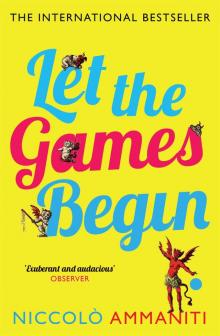 Let the Games Begin
Let the Games Begin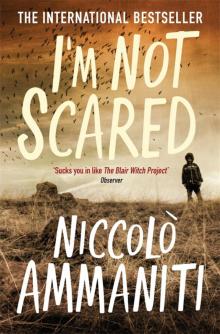 I'm Not Scared
I'm Not Scared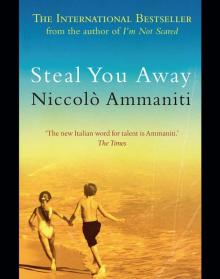 Steal You Away
Steal You Away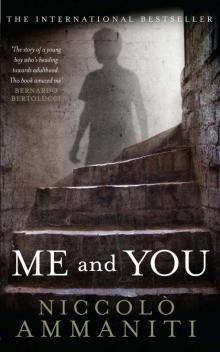 Me and You
Me and You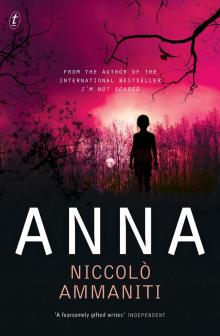 Anna
Anna